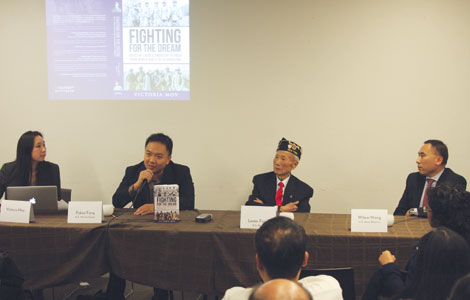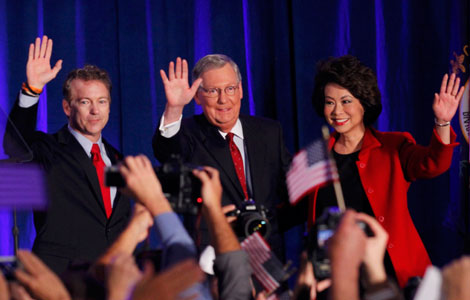Election results a mixed blessing for China
Updated: 2014-11-07 02:09
By Don Bonker(China Daily USA)
|
||||||||
Republicans exceeded early predictions scoring big time in Tueday's election, taking full control of the US Senate, increasing their margin in the House of Representatives along with many victories across the country. For the next two years, the United States will have a truly divided government with the Republicans claiming a new mandate to push an alternative agenda.
While many factors were in play in the 2014 election (Obama's poor ratings, huge amounts of campaign spending, etc), the fundamentals in recent history clearly favored the Republican Party. The party of whoever occupies the White House in mid-term elections suffers nominal loses of Senate and House seats and predictably weakens the President's political standing. As we are reminded by David Schanzer and Jay Sullivan in the New York Times, "This is a bipartisan phenomenon; Democratic presidents have lost an average of 31 House seats and between 4-5 Senate seats in mid-; Republican presidents have lost 20 and 3 seats respectively."
How will the election results affect the US-China relationship?
Neither Republicans nor Democrats have well-defined or predictable policies toward China. In recent years, a small group in Congress has attacked China on a select number of issues but such actions are not part of either Congressional leader's agenda. Existing Federal laws, such a CFIUS, provide opportunities for a single Congressman to go after China, often to lend support to a company in his state.
Republicans, known to be pro-trade and pro-business, taking control of the Senate should be a healthy sign in building closer relations with China, especially since governors in their states are leading trade missions to China, seeking Chinese investments and pursuing markets for their exporting companies.
However, individual Republican Senators have sent letters to CFIUS and other Federal agencies opposing China-related investments and transactions. Many senior Republicans in Congress have expressed skepticism over China due to its government's Communist Party control, reported human rights concerns, US support of Taiwan and Japan, China's military build-up, economic espionage and geopolitical or national security threats that could put pressure on the Obama Administration to be more assertive with China.
Several well-positioned Republican Congressmen have caused the biggest headaches for China. The issue, or fear, is rooted in cybersecurity threats and economic espionage that has led to Congressional investigations and legislation that greatly restrict China companies, such as Huawei and ZTE, from having access to telecommunication and related technology markets in the US. The two Congressmen who were responsible for these actions are retiring at the end of this year. The question is whether their replacements will continue such policies.
A related concern is the so-called Tea Party's growing influence that has put Republican Congressional leaders in a difficult position given the Tea Party's enduring political base and its extreme views on major issues (education and trade). It will likely affect the China relationship in negative ways, particularly on trade ("protect American jobs") and on cyber and economic espionage issues.
The Democrats have their own agenda which occasionally proves hostile to China. Several occupy leadership positions on committees that preside over government agencies and assert their political clout to press for higher import tariffs and related trade restrictions. This has more to do with politics than economics, particularly in the election season when labor unions pressure, if not intimidate Democratic candidates to "protect American jobs". Such protectionist policies are now prompting China to take reciprocal actions that may be placing China and America on the path of a trade war. Despite the encouraging bilateral discussions on the Bilateral Trade Agreement (BIT), there is no guarantee what happens once it arrives on the doorstep of the US Capitol.
Overall, the newly established Congress preparing for 2015 may be more favorable to China given the departures of some if its Capitol Hill critics, but a great deal of anxiety about China will continue - mistrust, economic and security threats and China's economy surpassing the US' in the foreseeable future.
In the Senate, the Republicans taking control will create a different political paradigm but with little indication on how it will play out over the next two years. The new political alignment will offer a narrow window for Congressional Republicans to provide stronger leadership and promote their own agenda and could result in more favorable actions (approval of TPP and TTIP trade pacts).
But that is in the short-term. It is unlikely the Republicans maintain the Senate majority in the 2016 elections, but the House of Representatives will comfortably stay in Republican control (given the shape of Congressional districts) for some time into the future. With a Democrat occupying the White House this will likely guarantee continued gridlock in Washington for the next decade.
The 2016 presidential election may be more favorable to Democrats for the same reasons the Republicans scored well this year. Barack Obama is not on the ballot and the Democrats will be far more unified (under Hillary Clinton) than the Republicans (the party may likely be split).
In 2016, the Republicans will have 23 Senate positions on the ballot compared to 10 for Democrats (also likely retirements/resignations). And the voter turn-out will jump back to 53 percent, which greatly favors Democrats in presidential elections. So whether political history will prevail and the Democrats re-take the Senate in 2016 or Republicans will defy the odds and remain in power is the big question going forward.
The author is former congressman of the United States.
Most Viewed
Editor's Picks

|

|

|

|

|

|
Today's Top News
China's wealthy look to make 'social impact' on education
Airline exec sees bright side for China and US
China, US must lead on climate: experts
China's coal solution could be in steam
Asian Americans supported Democrats in elections
Is Xiaomi ready for Western markets?
France to assist hunt for corrupt officials
New fund finances modern Silk Road
US Weekly

|

|
















